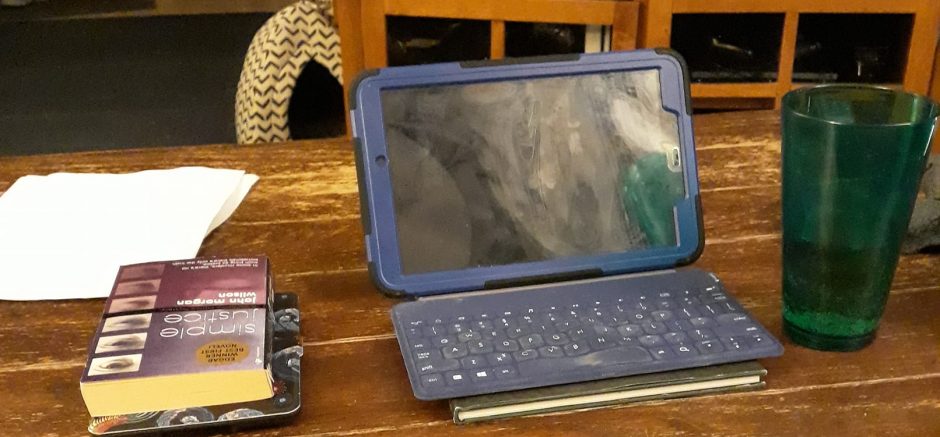This was the Dixie circuit–it was nothing for a Peterbilt to pull off the interstate with a six hundred pound rat, two-headed goats or a Donkey Woman nursing horsey-faced twins. Leviathan was the first whale me or Jimmy'd ever seen, coated in a slick layer of cottage cheese looking stuff. It just lay there. No posters of living whales or Shamu with a beach ball on his nose or instructions on how to behave in such a beast's presence. Just a bloated whale in a bed of formaldehyde, getting hauled through towns like Lonoke, a skinny boy standing on a plywood platform barking, "See Leviathan, Monster of the Deep. Today only." Right there in the Knight’s Grocery parking lot on a Friday afternoon, people cashing pay checks, pushing silver carts right up to the ticket booth to lay money down and see.
This was springtime, and every barbed-wire fence in Lonoke County was blown over with honeysuckle. I was sixteen, getting driven around in Becky Mallison’s Gold Grand Prix, ZZ Top playing out the moonroof. She was a senior cheerleader with cold black hair, and my mother had hit the ceiling when she’d showed up at the front door in cutoffs and nipples showing through her halter top.
"Would you like to drive around?" she asked through the screen door, the car keys jingling in one hand. 1976, the year the great tornado ripped the roof off our post office, so mail got up in the jet stream and they found our stamped letters on the glittering ice fields of Canada.
I said, "Can I, Mama?"
O.W., my stepfather, was dead-heading home, his truck emptied of slaughterhouse turkeys.
"Okay," she said. "If Jimmy goes."
Becky said, "Fine," and the three of us walked out and got in her Grand Prix, drove over the railroad tracks and there it was on the left, a slate grey trailer with a scarred head painted on its side.
We cut into the parking lot, cruised into a parking place and pulled the E‑brake. "Want to see?" she asked, and smiled this wide smile. One of her halter straps had slipped and she was tan already, and her teeth were white and even. My kid brother and I got out, followed her up to the folding table where the truck driver sat with a cigar box, twenty-five cents magic markered on the flap.
My pockets were empty.
"Here," Becky said, and passed over a dollar. "Go first."
I climbed the steps, Jimmy at my heels. Leviathan's arrival was an annual deal. Somehow it'd got out that the thing could commune with the spirit world, so everybody and their momma came to stand in line.
Jimmy pointed. "These idiots believe it talks to dead people."
A lady up ahead of us lay down talking to the whale's head. She'd got down on her hands and knees, put her mouth up close to one of the filmy eyes. "Daddy?" she was saying. "Can you hear me? Are you listening?"
"Shit," Jimmy said. "Who'd p‑pay for that?"
Behind us, Becky said, "Me."
The woman on her hands and knees was crying–the grief was hard on her, you could tell. I wondered what I'd have to say to the whale's head when my time came. I was thinking about the other-worldly feel of getting your ass kicked, how Momma's face looked like inside the car the time O.W.’d killed it on a railroad track, got out, shut the door and walked away, how Momma'd sat there and hummed "Moon River." until he disappeared.
"They sing," Becky said, the three of us up to the twin blow holes now. Above, a sign said Leviathan was also known as Devil Fish, Gray Back, Mussel Digger and Rip Sack. The fifty-foot cow was permanently blind, the sign said, from swimming over mussel beds on her side, scraping up Goliath mouthfuls. "They can hear each other for a thousand miles."
Jimmy and I looked at each other. Outside, somebody racked off muffler glass-packs– O.W.'s Chevy, it sounded like.
The woman cut us a hard look. Then she turned back to the whale, put her lips to the fetid face and kissed it. "I know. I know you didn't mean to, Daddy. I fer-gid you."
It was embarrassing, the whale's eyes like greasy saucers.
We didn’t talk on the way home. The car was quiet and hot. Summer was on us. I had a job in concrete–a car was in the works. O.W. was mowing the grass when we got home–that look in his eye.
Becky let us out. "That lady was bonko," she said, looked me square in the face. "Calling that thing Daddy."
 Michael Gills was McKean Poetry Fellow at the University of Arkansas and Randall Jarrell Fellow in Fiction in the MFA Program at the University of North Carolina-Greensboro. He earned the Ph.D. in Creative Writing/Fiction at the University of Utah. His work has appeared in McSweeney's, Oxford American,Verb 4, Shenandoah, Boulevard, The Gettysburg Review, The Greensboro Review, Quarterly West, New Stories From The South and elsewhere. Why I Lie: Stories (University of Nevada Press, September, 2002) was selected by The Southern Review as a top literary debut of 2002. A 2005-06 Utah Established Artist Fellowship recipient, Gills is a contributing writer for Oxford American and a board member for Writers @ Work. He is currently a professor of writing for the Honors College at the University of Utah, and is marketing a second collection of stories, THE DEATH OF BONNIE AND CLYDE, the title story of which appears in the current Southern Humanities Review.
Michael Gills was McKean Poetry Fellow at the University of Arkansas and Randall Jarrell Fellow in Fiction in the MFA Program at the University of North Carolina-Greensboro. He earned the Ph.D. in Creative Writing/Fiction at the University of Utah. His work has appeared in McSweeney's, Oxford American,Verb 4, Shenandoah, Boulevard, The Gettysburg Review, The Greensboro Review, Quarterly West, New Stories From The South and elsewhere. Why I Lie: Stories (University of Nevada Press, September, 2002) was selected by The Southern Review as a top literary debut of 2002. A 2005-06 Utah Established Artist Fellowship recipient, Gills is a contributing writer for Oxford American and a board member for Writers @ Work. He is currently a professor of writing for the Honors College at the University of Utah, and is marketing a second collection of stories, THE DEATH OF BONNIE AND CLYDE, the title story of which appears in the current Southern Humanities Review.





